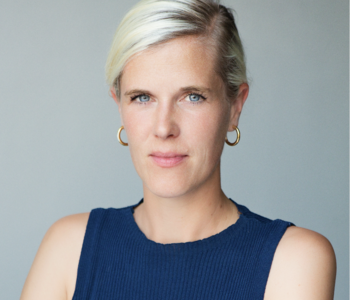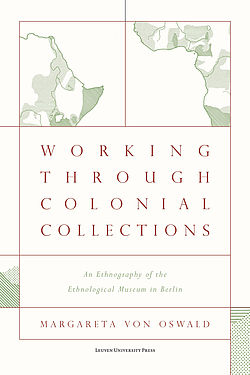Margareta von Oswald | Associated Researcher

Home Institution
:
Humboldt-Universität zu Berlin, EHESS
|
Position
:
research associate
|
Disciplines
:
Anthropology
|
Biography
I am an anthropologist, postdoctoral researcher and currently Mindscapes’ Curatorial Research Fellow at the Centre for Anthropological Research on Museums and Heritage at the Humboldt-Universität zu Berlin.
Mindscapes aims to support a transformation in how we understand, address and talk about mental health. It is initiated and funded by the London-based Wellcome Trust, and realised by its International Cultural Programmes Team. The project’s point of departure in Berlin is the Gropius Bau’s artist-in-residency Kader Attia’s engagement with repair, which culminated in the exhibition YOYI! Care, Repair, Heal and public programming (Sept 2022-Jan 2023).
My research is concerned with how people engage with difficult pasts, particularly colonial, in the present. From 2016-2021, I was a project researcher in the research project "Making Differences. Transforming Museums and Heritage in the 21st Century", led by Sharon Macdonald. Within the research group Transforming the Ethnographic“(with Jonas Tinius and Larissa Förster), we engaged with how the legacies of anthropological knowledge production and collecting are negotiated today, taking into account developments and perspecetives from the political, activist, research, artistic and curatorial spheres. One important outcome of the research group is the edited volume Across Anthropology. Troubling Museums, Colonial Legacies, and the Curatorial (ed. with Jonas Tinius).
My PhD addressed the possibilities and limits of ‘working through’ the ongoing articulations and effects of colonialism from within Berlin’s Ethnological Museum, and more particularly, its Africa department. Based on a two-year-ethnography of the museum’s different work practices (2013-2015), oral history interviews with current and former employees as well as archival work, the PhD examined the Museum’s embeddedness in colonial regimes of conceiving and doing the world. Whereas recent literature on museums tends to conceptualise them with metaphors related to change, to hybridity, and transformation, the PhD focused on how and why ‘the stubborn facts remain’. Crystallised in the notion of working through, reckoning with enduring colonial presences articulates as inconclusive and unsettling work in the Museum: it includes processes of recognition and acceptance of the colonial past and its duress, as well as multiple forms of difficulties, denials, resistances, and refusals to do so. The PhD thus addresses the relationship, frictions and tensions between agency and structure; between ‘good’ intentions and their unintended consequences.
Title of thesis
Working through colonial collections. An ethnography of the Ethnological Museum in BerlinSummary of thesis
What are the possibilities and limits of engaging with the ongoing articulations of colonialism in ethnological museums? This book addresses this question from within Berlin’s Ethnological Museum; more particularly, its Africa department. It captures the Museum in a moment of substantial transformation, as it prepared the move of its exhibition to the Humboldt Forum, a newly built and contested cultural centre on Berlin’s museum island. Debates around this move and the eethnolgoical collections have served as central prisms to negotiate Germany’s stance towards its colonial history. The book discusses almost ten years of debate during which German colonialism has been negotiated, and further recognised, via conflicts over its colonial museum collections (2012-2021).
Crystallised in the notion of ‘working through’, the reckoning with enduring colonial presences articulates as inconclusive and unsettling work in the Museum. It includes processes of recognition and acceptance of the colonial past and its duress, as well as multiple forms of difficulties and resistances to do so. ‘Working through colonial collections’ then points to central questions which concern our contemporary societies more generally: the reverberance, echoes, and aftermaths of colonialism in our everyday in its epistemologies, representations, materialities, or even more concretely,the words, relations, and affects we deal with.
This analysis is based on a two-year-ethnography of the museum’s different work practices, oral history interviews with current and former employees as well as archival work. Beyond recent debates on restitution and provenance, this ethnography engages with the diverse areas of expertise in the Ethnological Museum – the conserving, storing, ordering, curating, and researching of collections. The book examines the Museum’s embeddedness in colonial regimes of conceiving and doing the world: It shows how these regimes unfold in the Museum’s everyday – and thereby hopes to serve as a grid of analysis not only for other ethnological museums, but also Western museums more generally.
Institution of thesis
Supervisor
Le musée résonant
How do museums define their own role, and how do they change their modes of functioning and working accordingly in order to be able to act to become socially relevant? What impact does this have on curatorial practice in particular?
On the basis of the PROCOPE mobility grant from the French Embassy, I will be in France from autumn 2023 to engage in exchange with actors from the French museum and cultural institution landscape in order to explore the potentials of museum work.
Awkward Archives
March 01, 2023Margareta von Oswald , Jonas Tinius, Bernd Scherer, Lynhan Balatbat-Helbock, Hannes Hacke, Yann LeGall,Franka Schneider, Tahani Nadim
ISBN: 978-3-948212-92-9
Awkward Archives proposes a manual for academic teaching and learning contexts. An ethnographic research approach is confronted with the demands of archival research as both disciplines challenge their inner logics and epistemologies. Through fieldwork and ethnographic tools and methods, both analogue and digital, the editors take various contemporary archival sites in Berlin as case studies to elaborate on controversial concepts in Western thought. Presenting as such a modular curriculum on archives in their awkwardness—with the tensions, discomfort and antagonisms they pose.
With case studies on Haus der Kulturen der Welt, the Hahne-Niehoff Archive and the Museum für Naturkunde Berlin, among others.
Working Through Colonial Collections. An Ethnography of the Ethnological Museum in Berlin
December 15, 2022Margareta von Oswald
Edition: Leuven University Press
ISBN: 9789461664259
Reckoning with colonial legacies in Western museum collections
What are the possibilities and limits of engaging with colonialism in ethnological museums? This book addresses this question from within the Africa department of the Ethnological Museum in Berlin. It captures the Museum at a moment of substantial transformation, as it prepared the move of its exhibition to the Humboldt Forum, a newly built and contested cultural centre on Berlin’s Museum Island. The book discusses almost a decade of debate in which German colonialism was negotiated, and further recognised, through conflicts over colonial museum collections.
Based on two years of ethnographic fieldwork examining the Museum’s various work practices, this book highlights the Museum’s embeddedness in colonial logics and shows how these unfold in the Museum’s everyday activity. It addresses the diverse areas of expertise in the Ethnological Museum – the preservation, storage, curation, and research of collections – and also draws on archival research and oral history interviews with current and former employees. Working through Colonial Collections unravels the ongoing and laborious processes of reckoning with colonialism in the Ethnological Museum’s present – processes from which other ethnological museums, as well as Western museums more generally, can learn.
With a preface by Sharon Macdonald.
https://lup.be/collections/category-anthropology/products/152458
Publications
Books and special issues
Examining De/Colonial Traces Through Colonial Collections / Examiner les traces dé/coloniales à travers les collections coloniales, 2025
Edited dossier in cooperation between the Académie des Traces and the online platform Contemporary And, with an introduction by Margareta von Oswald, and composed of 7 contributions by members of the Académie des Traces
Traces du dé/colonial au musée
Edited volume, with Felicity Bodenstein, Damiana Otoiu, Anna Seiderer, Paris, Editions Horizons d‘Attente, 2024
The Resonant Museum. Berlin Conversations on Mental Health / Berliner Gespräche über mentale Gesundheit, Open access publication in German and English, edited with Diana Mammana, Cologne, Verlag der Buchhandlung Franz und Walther König, 2024
Working Through Colonial Collections. An Ethnography of the Ethnological Museum in Berlin, Open access monography Leuven University Press, 2022
Awkward Archives. Ethnographic Drafts for a Modular Curriculum, Open access curriculum, edited with Jonas Tinius, Berlin/Milan/Dakar, Archive Books, 2022
Across Anthropology: Troubling Colonial Legacies, Museums, and the Curatorial, Open access edited volume, edited with Jonas Tinius, Leuven University Press, 2020
Engaging Anthropological Legacies, Special issue of Museum Worlds, edited with Henrietta Lidchi and Sharon Macdonald, 2018
